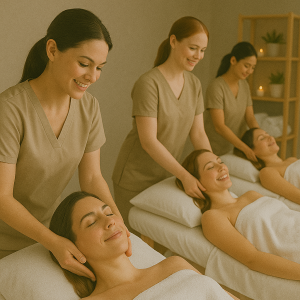 Self-care is everywhere. From spa day reels to candlelit bathtubs, the internet is filled with picture-perfect moments meant to combat burnout. However, for many overworked mothers, these quick fixes barely scratch the surface. Real self-care isn’t always luxurious or Instagram-worthy, but it’s about healing, setting boundaries, and reclaiming mental wellness.
Self-care is everywhere. From spa day reels to candlelit bathtubs, the internet is filled with picture-perfect moments meant to combat burnout. However, for many overworked mothers, these quick fixes barely scratch the surface. Real self-care isn’t always luxurious or Instagram-worthy, but it’s about healing, setting boundaries, and reclaiming mental wellness.
Increasingly, exhausted mothers are seeking support not through products, but through professional wellness services. OPCMD, a centralized hub for opi sites in South Korea, makes it easier for mothers to find trusted establishments that provide meaningful restorative care.
Moms Carry Heavy Loads
Mothers are planners, caregivers, emotional anchors, and decision-makers. While motherhood is full of love and fulfillment, it also brings relentless pressure and fatigue.
According to the American Psychological Association, mothers consistently report higher levels of stress than other demographics. Factor in financial strain, relationship tensions, lack of sleep, and the invisible labor of parenting, and it’s no surprise that so many moms feel depleted and unseen.
The Limits of Traditional Self-Care
A warm bath or a ten-minute face mask might offer a fleeting escape, but they don’t always meet deeper emotional and physical needs. What many moms truly crave is presence, touch, calm, and connection, the kind that doesn’t require them to give anything in return.
That’s where massage therapy, guided relaxation, and holistic wellness services step in. These are not indulgences. They are practical and therapeutic options that provide a space for overworked moms to rest, reconnect with themselves, and simply breathe.
What Massage and Wellness Services Offer
Unlike rushed appointments or superficial pampering, quality massage and wellness services create a safe, professional environment where mothers can let go of stress without needing to perform or explain.
These services might include:
- Therapeutic massage to release physical tension and ease anxiety
- Aromatherapy to calm the nervous system
- Breathwork or guided meditation sessions to restore mental clarity
- Gentle stretching or bodywork to bring awareness back to the body
The best practitioners are trained not only in technique but in how to hold space with compassion and care. For some moms, these sessions are the only time in the week they feel physically and emotionally supported.
Breaking the Stigma Around Asking for Help
There’s still a stigma around seeking help, especially for moms, who are often expected to manage it all without complaint. But true self-care isn’t selfish. It’s recognizing that you can’t pour from an empty cup.
Massage and wellness services provide a non-clinical, non-judgmental outlet that supports emotional regulation, body awareness, and stress reduction. They’re not a replacement for therapy, but they can be a powerful supplement, especially for those who feel overwhelmed, anxious, or disconnected from themselves.
Wellness as Preventative Mental Health Care
Think of massage and wellness sessions as emotional maintenance, just as important as physical upkeep. By regularly addressing stress and tension, these practices can help prevent burnout, reduce mood swings, and improve sleep quality.
For example, a 60-minute massage may help reduce cortisol levels, ease muscle tension, and activate the parasympathetic nervous system, all of which contribute to improved emotional balance. Over time, these benefits compound, building resilience and a deeper sense of calm.
Making Support More Accessible
Cost and availability can be barriers, but many massage centers now offer sliding-scale pricing, group sessions, or community wellness events to broaden access. Some even collaborate with postpartum or family support organizations to reach moms who might otherwise feel left out.
The wellness industry is also raising its standards, with more emphasis on professional training, ethics, and safety protocols. That means moms can access high-quality care with confidence and peace of mind.
Reframing What Self-Care Means
Self-care isn’t always solo yoga or journaling. Sometimes, it’s lying quietly on a massage table while someone cares for your tension. Sometimes, it’s 60 minutes of stillness, where you don’t have to speak, fix, or carry anything. Sometimes, it’s just being in a space where you’re allowed to rest, no questions asked. And that’s not indulgent. That’s human.
As more people embrace massage and holistic wellness services as valid forms of support, we’re collectively moving toward a definition of self-care that’s grounded, practical, and inclusive. These services may not solve everything, but for many moms, they offer a small but powerful way to stay connected to themselves. And that deserves our attention.

